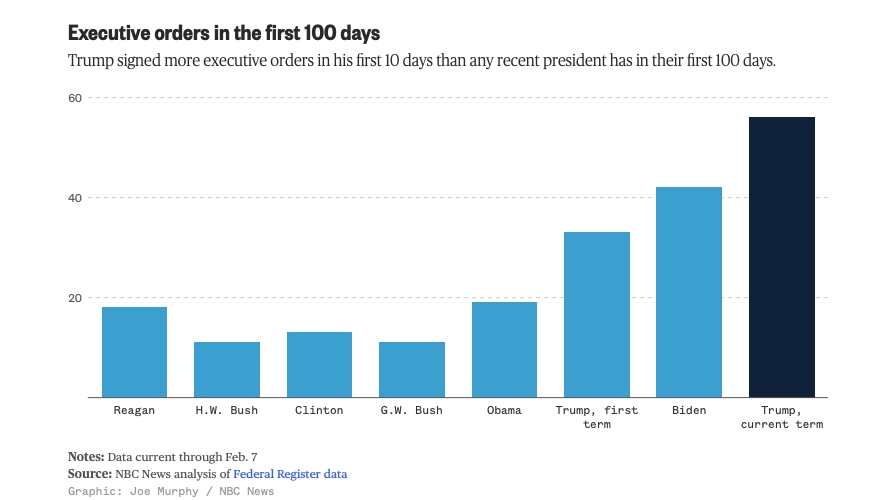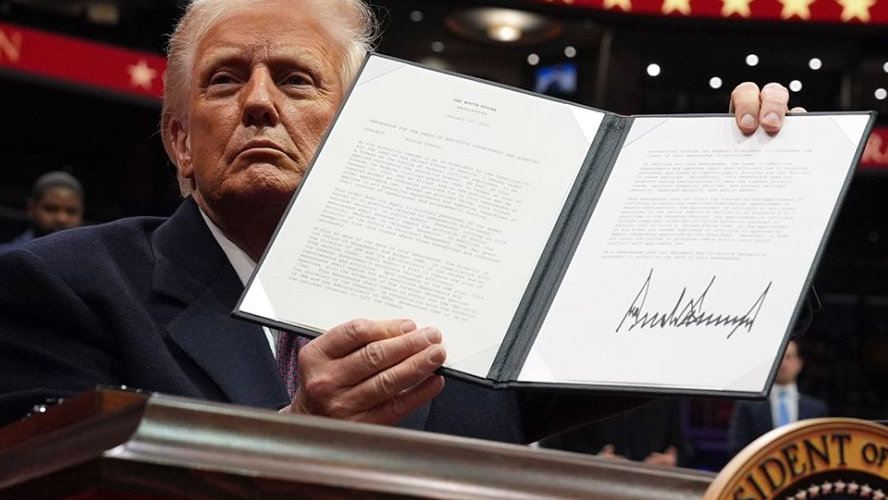Government by executive order is as far from democratic as you can get — and quite unconstitutional. So at first blush, this does not look like a good sign:

“The orders, which Trump critics say greatly exceed his constitutional authority,” explains NBC News, “range from tariffs on Mexico, China and Canada, to pauses on foreign aid and crackdowns on illegal immigration to bans on transgender people serving in the military and the use of federal funds for gender-affirming medical care for minors.”
But there is another way to look at it, as Paul Jacob argued on Wednesday: “If the net effect of Trump’s barrage of executive orders and DOGE edicts is to reduce government burdens, is it really the kind of tyranny we must freak out about?”
The general effect of governance since the world wars and the Great Depression has been an increase in federal burdens on individual citizens, businesses, communities, and the states themselves. Lost in the workings of an increasingly imperialistic nation-state, the original idea of a federal republic got lost. The growth of “Deep State” institutions — a permanent administrative state combined with corporate contractors (“the military-industrial complex” of Ike’s warning) engaging in secrecy and lies — has changed the complexion of the existing constitution, no more astounding than in the way it uses taxpayer money to influence taxpayer opinion for political effect.
This excresence became painfully obvious this last week when the Department of Government Efficiency uncovered the quasi-secret subsidies of the USAID programs to mainstream American news-and-opinion media, Politico being just the tip of the iceberg.
Trump’s (and Elon’s) activities, to the extent that they diminish government power or reduce the amount of wealth redistributed from some groups of people to others, is better defined as the opposite of tyrannical.
But of course, to the extent the executive orders increase state power, and without congressional sanction, then that is very much going in the wrong direction.
Still, the upshot must be this: we do not live in a constitutionally ordered free society; precipitous action that returns us to such an order are not so much tyrannical as liberating.
To judge the general tenor of these orders, properly, consulting a good compendium, such as NBC’s, has to be a good start.
But the idea that Trump and Elon are not doing what they are elected to do, but that they are, as Senator Elizabeth Warren puts it, “seizing power from the American people,” does not seem a good interpretation of recent political trends.
And the idea that the American people have been in charge but are not now is preposterous.
Senator Chuck Schumer’s charge is even more bizarre. “Before our very eyes, an unelected, shadow government is conducting a hostile takeover of the federal government.” DOGE may be hostile, but it is out in the open — not shadowy at all — and not so much taking over federal government as shutting down parts of it.
“What’s funny about this claim,” counters Bridget Phetasy, “is that an unelected shadow government just ran this country for four years while they hid the fact that the elected president was barely functioning … and shamed Americans for pointing it out.”
